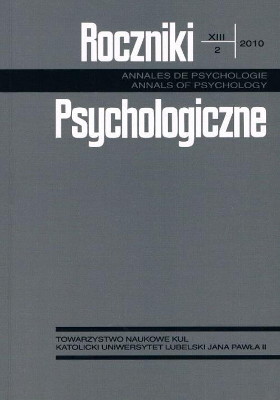Rola wskazówek i przekonań w długotrwałej pamięci cen
Abstrakt
W badaniach pamięci cen sprzed lat osoby mają skłonność do przypominania sobie cen jako niższych niż były w istocie. Celem dwóch przeprowadzonych eksperymentów była analiza czynników wpływających na tę tendencyjność. Założono, że zaniżanie wynika z nietrafnej lokalizacji okresu, z którego cena ma być przywołana, oraz z przekonania o ciągłym i znaczącym wzroście cen. Zgodnie z przewidywaniami, tendencja do zaniżania osłabła, gdy badanym podano dodatkowe wskazówki czasowe, i nie wystąpiła w odniesieniu do produktu uważanego za taniejący. Uzyskane wyniki są spójne z asocjacyjną teorią pamięci cen Kempa (1999), zasadą specyficzności kodowania (Tulving, Thompson, 1973) oraz ujęciami pamięci podkreślającymi rolę prywatnych teorii zmiany w przypominaniu (Ross, 1989).
Bibliografia
Bates, J. M., Gabor, A. (1986). Price perception in creeping inflation: Report on an inquiry. Journal of Economic Psychology, 7, 291-314.
Cestari, V., Del Giovane, P., Rossi-Arnaud, C. (2007). Memory for prices and the euro cash changeover: An analysis for cinema prices in Italy. Bank of Italy Economic Research Paper, 619; http://papers.ssrn.com/sol3/papers.cfm?abstract_id=970301 (8.10.2007).
Conway, M. A. (1992). A structural model of autobiographical memory. W: M. A. Conway, D. C. Rubin, H. Spinnler, W. A. Wagenaar (red.), Theoretical perspectives on autobiographical memory (s. 167-193). Dordrecht: Kluwer Academic Publisher.
Davies, P. J. (1999). Gender differences in autobiographical memory for childhood emotional experiences. Journal of Personality and Social Psychology, 76, 3, 498-510.
Del Giovane, P., Sabbatini, R. (2006). Perceived and measured inflation after the launch of the euro: Explaining the gap in Italy. Giornale degli Economisti e Annali di Economia, 65, 2, 155-192. Falkowski, A., Tyszka, T. (2009). Psychologia zachowań konsumenckich. Gdańsk: Gdańskie Wydawnictwo Psychologiczne.
Janssen, S. M. J., Chessa, A. G., Murre, J. M. J. (2006). Memory for time: How people date events. Memory & Cognition, 34, 137-148.
Kemp, S. (1984). Perception of changes in the cost of living. Journal of Economic Psychology, 5, 313-323.
Kemp, S. (1987). Estimation of past prices. Journal of Economic Psychology, 8, 181-189.
Kemp, S. (1991). Remembering and dating past prices. Journal of Economic Psychology, 12, 431-445. Kemp, S. (1999). An associative theory of estimating past dates and past prices. Psychonomic Bulletin & Review, 6, 1, 41-56.
Kemp, S., Willetts, K. (1996). Remembering the price of wool. Journal of Economic Psychology, 17, 115-125.
Łyziak, T. (2003). Consumer inflation expectations in Poland. Working Paper Series, European Central Bank, 287; http://www.ecb.int/pub/scientific/wps/author/html/author310.en.html (21.11.2008).
Marques, J. P., Dehaene, S. (2004). Developing intuition for prices in euros: Rescaling or relearning prices? Journal of Experimental Psychology: Applied, 10, 3, 148-155.
McFarland, C., Ross, M. (1987). The relation between current impressions and memories of self and dating partners. Personality and Social Psychology Bulletin, 13, 228-238.
McFarland, C., Ross, M., Giltrow, M. (1992). Biased recollection in older adults: The role of implicit theories of aging. Journal of Personality and Social Psychology, 62, 837-850.
Niedźwieńska, A. (2003). Gender differences in vivid memories. Sex Roles, 49, 321-331.
Prohaska, V., Brown, N. R., Belli, R. F. (1998). Forward telescoping: The question matters. Memory, 6, 4, 455-465.
Ross, M. (1989). Relation of implicit theories to the construction of personal histories. Psychological Review, 96, 341-357.
Ross, M., Holmberg, D. (1990). Recounting the past: Gender differences in the recall of events in the history of a close relationship. W: M. P. Zanna, J. M. Olson (red.), Self-inference processes (s. 135-152). Hillsdale, NJ: Erlbaum.
Strzeszewski, M. (2006). Najważniejsze wydarzenia 2005 roku dla Polski i świata (komunikat z badań nr BS/16/2006). Warszawa: Centrum Badania Opinii Społecznej; http://www.cbos.pl/ SPISK0M.P0L/2006/k_016_06.pdf (21.02.2008).
Thompson, C. P. (1990). Reconstructing the dates of personal events: Gender differences in accuracy. Applied Cognitive Psychology, 4, 371-381.
Tulving, E., Thompson, D. M. (1973). Encoding specificity and retrieval processes in episodic memory. Psychological Review, 80, 352-373.
Vartia, P., Mankinen, R. (1984). Perceived and expected price changes in Finland. Weltwirtschaftliches Archiv, 120, 121-132.
Webster, J. D., McCall, M. E. (1999). Reminiscence function across adulthood: A replication and extension. Journal of Adult Development, 6, 1, 73-85.
Willard, G., Gramzow, R. H. (2008). Exaggeration in memory: Systematic distortion of self-evaluative information under reduced accessibility. Journal of Experimental Social Psychology, 44, 246-259.
Yarmey, A. D. (1993). Adult age and gender differences in eyewitness recall in field settings. Journal of Applied Social Psychology, 23, 1921-1932.
Copyright (c) 2010 Roczniki Psychologiczne

Utwór dostępny jest na licencji Creative Commons Uznanie autorstwa – Użycie niekomercyjne – Bez utworów zależnych 4.0 Międzynarodowe.


